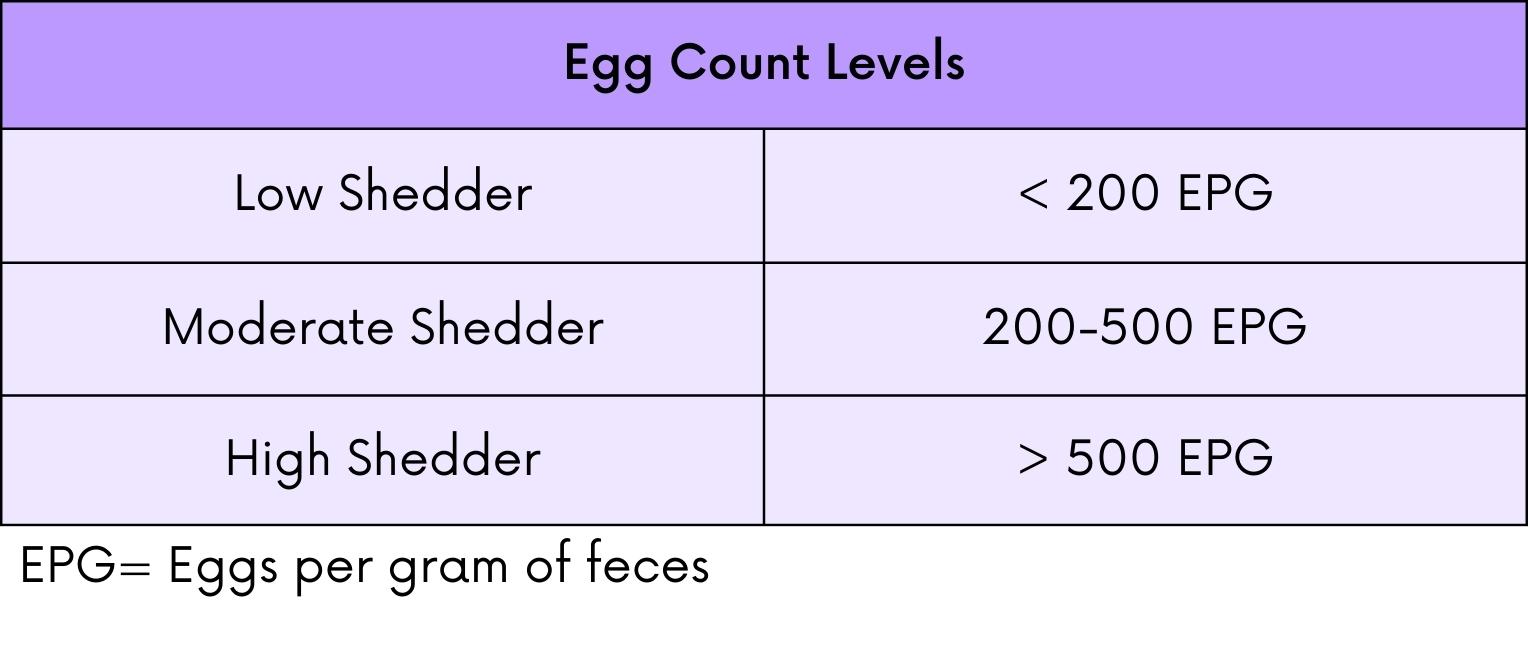
Horses are grazing animals, and consequently, they all have some level of internal parasites. The goal of deworming is to limit the number of parasites so that our equine friends remain healthy and free of clinical illness. The goal is NOT to eradicate all parasites.
It is important to note that traditional deworming protocols have become outdated. Frequent and/or inappropriate use of dewormers builds drug resistance, so commonly used drugs are becoming less and less effective. With the help of tools like the fecal egg count, your veterinarian can help you devise a deworming protocol tailored to the needs of your horse.
Common Internal Parasites Clinical Signs
The most important internal parasites in adult horses are small strongyles and tapeworms, while the most important internal parasites in young horses are roundworms. Horses can have internal parasites while still appearing to be relatively healthy. But in some individuals, especially young or immunocompromised horses, parasites can take a visible toll. Clinical signs vary depending on the parasite, but may include the following:
- Small strongyles – severe damage to intestinal lining, diarrhea, colic, weight loss
- Tapeworms – colic (mild to severe)
- Roundworms – coughing and nasal discharge, poor body condition, delayed growth,
- rough hair coat, pot belly, and colic (mild to severe)
- Large strongyles – colic
- Pinworms – severe itching in the tail region
- Bots – can damage stomach lining, oral ulcerations
Fecal Egg Count (FEC)
A fecal egg count is a microscopic examination of fresh manure for parasite eggs. This simple test allows your veterinarian to determine which parasites are present and if your horse is a low, moderate, or high shedder. Horses should be tested at least once per year, and it is important to test each individual horse. Although horses grazing together may share the same parasite population, they show huge differences in their levels of egg shedding. In fact, within any group of mature horses, only a small percentage (15-30%) is responsible for shedding approximately 80% of the eggs.

It is important to note that a negative FEC does not mean the horse is free of parasites. Larvae are not accounted for in this test and may still be present in large numbers in a horse with an FEC of zero. It may miss tapeworm eggs with routine FEC techniques.
Your veterinarian can help you develop a specific deworming protocol based on your horse’s status, but here are some general recommendations as provided by Colorado State University:
LOW SHEDDERS
- Spring – ivermectin (Equell®, Zimectrin®, Rotectin®, IverCare®) or moxidectin (Quest®)
- Fall – ivermectin w/ praziquantel (Equimax®, Zimectrin Gold®) or moxidectin with praziquantel (Quest Plus®)
MODERATE SHEDDERS
- Spring – ivermectin (Equell®, Zimectrin®, Rotectin®, IverCare, etc.), moxidectin (Quest®)
- Late summer – ivermectin
- Fall – ivermectin w/ praziquantel (Equimax®, Zimectrin Gold®) or moxidectin with praziquantel (Quest Plus®)
HIGH SHEDDERS
- Spring – ivermectin (Equell®, Zimectrin®, Rotectin®, IverCare®), moxidectin (Quest®)
- Summer – ivermectin
- Early fall – ivermectin w/ praziquantel (Equimax®, Zimectrin Gold®)
- Late fall – moxidectin (Quest®)
* Daily pyrantel tartrate such as Strongid® can be considered for suppression of egg shedding in consistent high strongyle shedders.
Young Horses
Horses younger than 3 years of age require special attention, as they are more susceptible to parasite infection and are at increased risk of developing disease. As mentioned above, the most important internal parasite in young horses is roundworms, also known as ascarids. In large numbers, these parasites can lead to colic and, more specifically, life-threatening impactions.
As a rule of thumb, foals should be dewormed a minimum of four times during their first year of life:
- 2 months – fenbendazole (Panacur®) or oxibendazole (Anthelcide®)
- 4-6 months – fenbendazole (Panacur®) or oxibendazole (Anthelcide®)
- 9 months - ivermectin plus praziquantel (see above products)
- 12 months – ivermectin
* FEC is recommended at the time of weaning to determine whether worm burdens are primarily ascarids or strongyles.
Yearlings and two-year-olds should continue to be treated as "high" shedders and receive about three to four yearly treatments.
Alternative Remedies
An increasing number of so-called organic or herbal dewormers are appearing on the market. Some examples include herbs (e.g., garlic, rosehip, kelp, seaweed, etc.), prebiotic and probiotic administration, diatomaceous earth, etc… The efficacy of these products has never been showed in formal, controlled evaluations and they are not FDA-approved. Products that are not FDA-approved do not have to follow the same rules that apply to marketing, so advertisers can say just about anything they want, and their products do not have to be effective. These products are unlikely to hurt your horse but should at the very least be used in conjunction with annual fecal egg counts for surveillance.